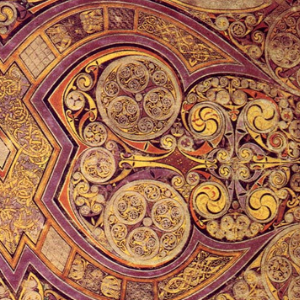 A Reflection for the Wednesday of the Third Week of Lent
A Reflection for the Wednesday of the Third Week of Lent
Meet Niall. He’s a just a guy doing his job in eighth-century Ireland. He’s pretty respected in his field – general kinging and whatnot – and he’s at the top of his game when a crying woman enters his court, bringing a baby and one heck of a mystery.
It appears the baby was conceived without a father. She claims that she hasn’t had relations with a man in many a long year, and that has everyone floored. Everyone but Niall. You see, Niall’s a man of the world. He’s pretty open-minded, and so he asks: “Ok, if you didn’t fool around with a guy – how about a girl? And is that other lady married?” Yes, and yes. “Well, that explains it then – you were vicariously impregnated.”
Woah! Minds blown, the audience has barely grappled with the big reveal when…WHAM! A priest falls from the sky. Apparently, this rando has been held captive by flying demons for decades – possibly centuries – and Niall’s decision was so wise and wonderful it literally blasted those demons from the skies and released their prisoner. Mother and priest exit together, and the next claimant comes forward. Just another day in the court of Niall Frosach.
Such miracles abound in the tales of the Irish kings, whose righteousness (fír flathemon) frequently brought showers of silver, bountiful harvests and fluffier sheep. Is this what Moses had in mind when he tells Israel to obey the laws and thereby “give evidence of your wisdom…to the nations”? Righteousness equals wealth? Military conquest? Skydiving priests?
No, I think Moses had a different metric in mind: community. The prophet is preparing his people to enter a new land and prosper as a society. He can’t go with them, so he’s giving them a how-to guide for living together peacefully. And frankly, given their track record, they need all the help they can get. From prohibitions against murder to dietary restrictions, Moses has it covered. This attention to detail, however, should not be taken as endorsing blind legalism. Yes, Moses commands obedience, but he also commands remembrance. He tells the Israelites to remember how God walked the earth among His people, but only so far as they trusted in Him and in each other. Moses spent a lifetime forging that trust, and he left behind a law to preserve that trust in his absence.
Today, we’re standing at a similar threshold. It took a year, but like Moses atop Mount Nebo, we finally see a brighter future within our grasp. We are nearly done wandering, but as we approach this hopeful horizon, we must prepare and we must remember. We must prepare for a new order built on trust as we remember the desolation that came when our trust failed. We can start by taking a page out of Niall’s book. Let’s abandon our preconceptions, accept people as they come to us and seek understanding before judgment. Only then can we fulfill the spirit of the law and welcome God’s grace, even when we are least expecting it.



